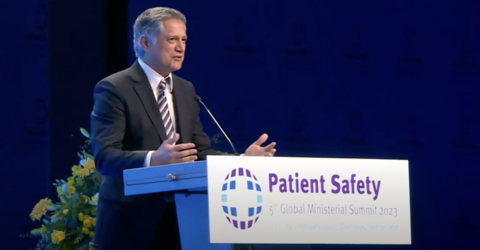In a keynote address at the Fifth Global Ministerial Summit on Patient Safety, Joe Kiani, founder of the Patient Safety Movement Foundation (PSMF), called for hospitals around the world to show greater transparency in reporting medical errors and preventable deaths. He also stressed the importance of aligned incentives, so providers are paid on quality of care rather than quantity and the adoption of Actionable Evidence-Based Practices addressing the known causes of harm.
This press release features multimedia. View the full release here: https://www.businesswire.com/news/home/20230227005765/en/

Joe Kiani Provides Keynote at the 5th Annual Global Ministerial Summit on Patient Safety (Photo: Business Wire)
“We need not just access to healthcare, it has to be safe, it has to be dignified,” said Kiani. “To get there, we have to create self-governing actions. If we can agree on the medical errors that can be prevented through evidence-based practices, those then can be tracked by every hospital. And they could report every year, every quarter, on their website publicly, the number of harms they have for each of those errors.”
Transparency, Kiani argued, is critical because publicly revealing data on preventable medical errors helps to accelerate the pace of change.
In countries where healthcare is at least partially subsidized by the government, Kiani suggested introducing major financial incentives for hospitals to be more transparent and active in patient safety by implementing evidence-based practices for preventing errors.
“In my country, half of the care is paid for by the Government. Medicare and Medicaid pays for more than half the care in every hospital,” he said. “So therefore, they could mandate that to get that reimbursement, they want transparency, and that they will tie their performance to the payment. So if hospitals have zero medical errors, zero preventable deaths, they don't have to do anything. But if someone is harmed, and those evidence-based practices were not in place, they should not get paid. This becomes a way that every board of directors of every hospital will expect their management to implement evidence-based practices.”
As an example of how this can work, Kiani cited his time on the board of directors of Children's Hospital of Orange County (CHOC), California. “When I began at CHOC, I was happy to see they were looking at quality,” he said. “They were looking at medical errors, but they were comparing themselves to their colleagues, and if they were lower in error rate than others, that was considered a job well done. And I challenged them that shouldn't the goal be zero? To their credit, they accepted the challenge, and they went one step further, they tied the bonuses of the faculty to zero. Something incredible occurred at the next meeting, we went from hoping for zero, to planning for zero.”
“I want you all to take action out of kindness!” concluded Joe Kiani.
The Global Ministerial Summit on Patient Safety is an annual event that brings together ministers, high-level representatives, and experts from around the world. This year’s summit was hosted by President Alain Berset and the distinguished speakers included; Tedros Adhanom Ghebreyesus, Director-General, World Health Organization; Professor Didier Pittet, Professor of Medicine at the University of Geneva; Dr. Anthony Staines, Patient Safety Program Director of Vaud Hospital Federation in Switzerland; Professor Dr. Phil Lauren Clark, Professor of Implementation Science in Health Care; and Professor Sir Liam Donaldson, WHO Patient Safety Envoy.
This year the Patient Safety Movement Foundation will hold its 10th Annual World Patient Safety, Science & Technology Summit on June 1st and 2nd in Newport Beach, California.
ABOUT THE PATIENT SAFETY MOVEMENT FOUNDATION
In 2012, Joe Kiani founded the non-profit Patient Safety Movement Foundation (PSMF) to eliminate preventable medical errors in hospitals. His team worked with patient safety experts from around the world to create Actionable Evidence-Based Practices (AEBP) that address the top challenges. The AEBP is available without charge to hospitals online. Hospitals are encouraged to make a formal commitment to ZERO preventable deaths, and healthcare technology companies are asked to sign the Open Data Pledge to share their data so that predictive algorithms that can identify errors before they become fatal can be developed. The Foundation's annual World Patient Safety, Science & Technology Summit brings together all stakeholders, including patients, healthcare providers, medical technology companies, government employers, and private payers. The PSMF was established through the support of the Masimo Foundation for Ethics, Innovation, and Competition in Healthcare. For more information, please visit psmf.org.
View source version on businesswire.com: https://www.businesswire.com/news/home/20230227005765/en/



